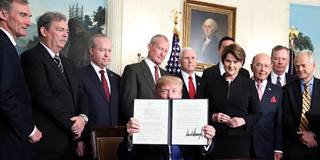US President Donald Trump's attempts to flex America's muscles with the use of tariffs harks back to one of the darkest periods of modern history. During the Great Depression, the governments of Britain and France pursued a similar policy, unwittingly alienating would-be allies and strengthening Nazi Germany.
PRINCETON – When countries get nervous about their security, they often insist that they need to reduce their dependence on foreign products, shorten supply chains, and produce more goods domestically. But does protectionism really improve security? Now that the world is hovering on the brink of a full-scale trade war, we should examine some of the arguments made in favor of protectionism, and then revisit the largest trade war of the twentieth century.
There tends to be a great deal of duplicity in debates about trade. Import tariffs and other similar measures are often presented as convenient foreign-policy tools for serving the general good. But if one looks past the rhetoric, it is obvious that such measures really just reward particular constituents, and amount to an unfair form of taxation.
US President Donald Trump would argue that a trade war is a means to an end. To his mind, tariffs are a reasonable response to unfair currency practices and national-security threats. But, of course, there is also a domestic political calculus: namely, tariffs will help specific producers and constituents by making their competitors’ goods more expensive. The problem is that tariffs inevitably force domestic consumers to foot the bill for that subsidy, by paying higher prices.

PRINCETON – When countries get nervous about their security, they often insist that they need to reduce their dependence on foreign products, shorten supply chains, and produce more goods domestically. But does protectionism really improve security? Now that the world is hovering on the brink of a full-scale trade war, we should examine some of the arguments made in favor of protectionism, and then revisit the largest trade war of the twentieth century.
There tends to be a great deal of duplicity in debates about trade. Import tariffs and other similar measures are often presented as convenient foreign-policy tools for serving the general good. But if one looks past the rhetoric, it is obvious that such measures really just reward particular constituents, and amount to an unfair form of taxation.
US President Donald Trump would argue that a trade war is a means to an end. To his mind, tariffs are a reasonable response to unfair currency practices and national-security threats. But, of course, there is also a domestic political calculus: namely, tariffs will help specific producers and constituents by making their competitors’ goods more expensive. The problem is that tariffs inevitably force domestic consumers to foot the bill for that subsidy, by paying higher prices.